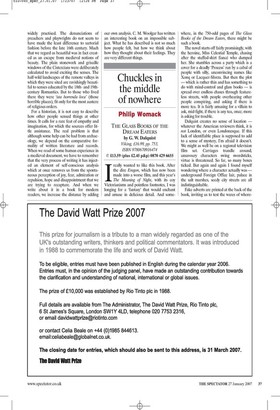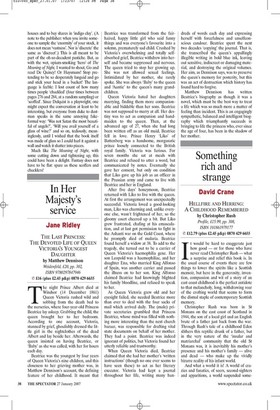Chuckles in the middle of nowhere
Philip Womack THE GLASS BOOKS OF THE DREAM EATERS by G. W. Dalquist Viking, £16.99, pp. 753, ISBN 9780670916474 © £13.59 (plus £2.45 p&p) 0870 429 6655 Ireally wanted to like this book. After the dire Eragon, which has now been made into a worse film, and this year's The Meaning of Night, with its coy Victorianisms and pointless footnotes, I was longing for a 'fantasy' that would enchant and amuse in delicious detail. And somewhere, in the 750-odd pages of The Glass Books of the Dream Eaters, there might be such a book.
The novel starts off fairly promisingly, with the heroine, Miss Celestial Temple, chasing after the stuffed-shirt fiancé who dumped her. She stumbles across a party which is a cover for a deadly 'Process' run by a cabal of people with silly, unconvincing names like Xonq or Lacquer-Sforza. But then the plot — which is rather thin and has something to do with mind-control and glass books — is spread over endless chases through featureless streets, with people overhearing other people conspiring, and asking if there is more tea. It is fairly amusing for a villain to ask, mid-fight, if there is any tea, once; more is asking for trouble.
Dalquist creates no sense of location — whatever the American reviewers think, it is not London, or even Londonesque. If this lack of identifiable place is supposed to add to a sense of mystery, I'm afraid it doesn't. We might as well be on a regional television film set. Carriages trundle around, unsavoury characters swing swordsticks, virtue is threatened. So far, so many boxes ticked. But again and again I found myself wondering where a character actually was — underground Foreign Office lair, palace in the salt marshes, seedy city streets are all indistinguishable.
Fake adverts are printed at the back of the book, inviting us to test the wares of whorehouses and to buy shares in 'indigo clay'. (A note to the publisher: when you invite someone to sample the 'enormity' of your stock, it does not mean 'vastness'. Nor is 'discrete' the same as 'discreet') This is all meant to be part of the oh-so-decadent pastiche. But, as with the wet, opium-smoking 'hero' of The Meaning of Night, I wanted to shout, Go and read De Quincy! Or Huysmans! Stop pretending to be so desperately languid and go and stick your head in a bucket! The language is feeble: I lost count of how many times people 'chuckled' (four times between pages 276 and 284, at a random sampling) or 'scoffed'. Since Dalquist is a playwright, one might expect the conversation at least to be interesting, but everyone from duke to dustman speaks in the same annoying fakeformal way: Was not Satan the most beautiful of angels?', 'Will you avail yourself of a glass of wine?' and so on, tediously, meaninglessly, until I wished that the book itself was made of glass so I could hurl it against a wall and watch it shatter into pieces.
Much like The Meaning of Night, with some cutting down and tightening up, this could have been a delight. Fantasy does not have to be flat: spare us these scoffers and chucklers!















































 Previous page
Previous page